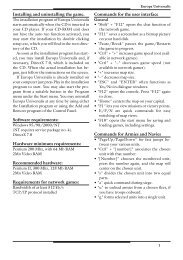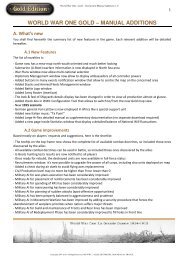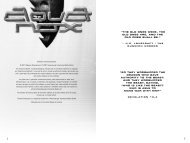Create successful ePaper yourself
Turn your PDF publications into a flip-book with our unique Google optimized e-Paper software.
War Weariness: +1 penalty to the War Weariness Test.<br />
Political Regime: each regime has special effects. See below.<br />
Free ‘Revolutionary’ Press<br />
The press is granted full freedom if the new regime is D or M. But combat<br />
losses have a more profound effect. The loss divider is reduced by 1.<br />
For example, in 1917 Russia has a Revolution, and her press is freed<br />
(regime D). The divider now is NW – 1/6 losses (instead of /7).<br />
Stabilization of the Revolution?<br />
At the end of the 3rd Interphase that follows the Revolution (that is, 1 year<br />
later), the situation is reassessed. A test is made to determine whether the<br />
effects of the Revolution settle down or continue until the next Interphase.<br />
There is no stabilization test for regimes A and C (for A, the check<br />
automatically succeeds at the end of the 2nd Interphase, for C stabilization<br />
is not possible).<br />
Stabilization Check (D12): 9+<br />
+/-? Parliament<br />
+1 regime D, Kerenski<br />
+/-? event<br />
If the stabilization test succeeds:<br />
● Stop the Revolution’s random effects (rule D. above no longer<br />
applies).<br />
● If the regime is D or M, democratic elections occur. Roll 1D6, and the<br />
Parliament becomes:<br />
[1] Pacifist<br />
[2–3] Warmonger<br />
[4–5] Hard-Liner<br />
[6] Union Sacree.<br />
- If the regime is A: no election, no change on the Parliament.<br />
- The risks of a new Revolution are lowered: +2 bonus to any future<br />
Revolution Test (cancelled if this check triggers a new Revolution).<br />
- From now on, Russia has a +0 modifier to her Instability Test and<br />
to all Social Tests (cancel the -1 penalty).<br />
If the stabilization test fails:<br />
● All the Revolution’s effects apply until the next Interphase (3 turns<br />
later).<br />
● A new test will occur during the next Interphase (and so on).<br />
List of Political Regimes<br />
Monarchic Regime “M” – Nicolas II<br />
No special advantage.<br />
Nicolas II did not abdicate or the new Czar is Michel IV. The Revolution’s<br />
immediate effects: Rasputin is shot.<br />
Parliament: its new mood is “Warmongering” this turn. Random variations<br />
the following turns.<br />
NW: goes up to 27.<br />
104 World War One: La Grande Guerre 1914-1918<br />
Press: free.<br />
Economy: the Civilian production moves up by 2 (in fact a penalty).<br />
GHQ: the supreme commander (Czar or Grand-Duke) is revoked.<br />
Democratic Regime “D” – Kerenski (historical in February 1917)<br />
Main advantage: Kerenski reduces the social risks, and gives bonuses to a<br />
Grand Offensive, and some secondary advantages to Entente.<br />
Kerenski may be installed in two ways:<br />
● randomly during a Revolution check;<br />
● or if Entente attempts a “Blue” putsch (playing the “Kerenski” event) to<br />
trigger a new Revolution.<br />
Revolution’s immediate effects: Polivanov (if minister) is fired, and Rasputin<br />
is shot.<br />
Parliament: its new mood is “Hard-liner” (+1 box) this turn. Then, random<br />
variation each turn.<br />
NW: goes up to 27.<br />
Press: free.<br />
Economy: the Civilian production moves up by 2 (a penalty).<br />
GHQ: the supreme commander is revoked (Czar or Grand-Duke).<br />
Other effects (Specific to Kerenski):<br />
Social Tests: Kerenski gives a +10% bonus to all Tests (strike, mutiny, etc),<br />
which cancels the -10% penalty due to the Revolution.
















